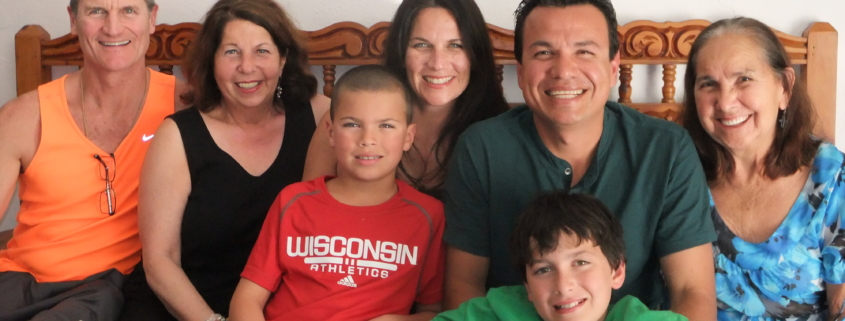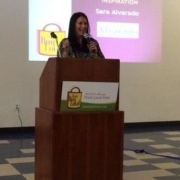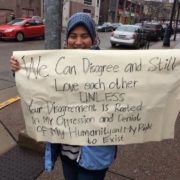Speaking Spanish with Strangers
More thoughts around race and privilege. Here is what happened on Saturday…
I was out and about with my husband and Leo, our 10 year old son, when we saw this beautiful young woman posing for a photographer. Under the hot sun she stood poised in an elegant white princess dress. At first I thought it was a wedding but she was alone and she was young. I quickly made the assumption that it was her quinceañera and gushed about how gorgeous she was. Leo pleaded with me not to say anything as we were about to walk by her (he is mortified by my overly friendly interactions with strangers on a regular basis).
As we passed by I said,
“Tan bella!” I paused and added, “You look stunning.”
She replied, “Thank you.”
My son shot me a glare and whispered, “You’re racist.” A bit dramatic, no?
Speaking Spanish to strangers that ‘look’ like they speak Spanish is the charge.
This is not a new story in our house. A couple of years ago Alex, my older son, gave me a hard time about speaking Spanish to strangers. He said it is rude for me (a little lighter than calling me racist) yet it’s okay for their Dad (native Mexican). I got defensive and then I shut up and listened.
We talked about why it’s different for me being White and being a native English speaker. The privilege is that I feel comfortable pretty much wherever I go in this country because of the color of my skin and because I speak English fluently. The truth is that not everyone feels the same.
But aren’t I making them feel more comfortable when I reach out and speak Spanish with them? Aren’t I being nice and friendly?
We answered that question with a couple of questions (Intent & Impact):
What is my intention? Am I speaking Spanish with others to try and make them feel more comfortable (assumption that they aren’t comfortable)? To show off that I know their language (assumption that they even speak Spanish)? To connect? To practice Spanish for myself?
Am I certain that they speak Spanish or want to? This is one of the most important lessons I’ve learned…LISTEN. There are millions of Hispanic people that want to be seen as native English speakers because THEY ARE, and prefer speaking English because THEY DO.
I listened to him and made some changes.
Instead of just speaking to strangers in Spanish right away I ask in English, “Do you speak Spanish?”
If they say yes I follow with, “Puedo hablar español contigo?” (translation: Can I speak Spanish with you?).
This allowed for two distinct situations to be clarified,
#1: I don’t assume that because someone looks like they speak Spanish that they do.
#2: I don’t assume that they want to speak Spanish with me just because they can.
This means that when I overhear people speaking Spanish in the grocery store I can talk to their baby in Spanish because I am certain the family actually speaks Spanish (and I can’t help gushing over cute babies). But if I’m at the bank and the Teller looks Hispanic (and even if s/he is speaking Spanish to a co-worker) I don’t start speaking Spanish.
This works for the most part. But sometimes I slip. On Saturday I assumed the young woman spoke Spanish so I complimented her in Spanish. She might not have cared at all. But what if she did? Some people struggle their whole life to be feel like they belong here. We all belong here but that isn’t how everyone is treated. And that sucks.
My kids are sensitive to this because most of their Spanish speaking friends still prefer to speak English. They are growing up bilingual in a country that doesn’t respect bilingualism like other countries.
I asked Alex what he does and he shrugged, “It depends on the situation. Sometimes I can speak Spanish and sometimes I can’t.” In Mexico he speaks Spanish with everyone but in the U.S. he assesses the situation and plays it out differently. He is light skinned; biracial. The rules aren’t spelled out clearly in his world yet. Am I supposed to be teaching him them? Because the reality is he is teaching me.
I don’t want to perpetuate racism. Yes I want to speak Spanish and if the opportunity comes up I’ll ask. But that is my deal. That is my privilege. I understand why I got defensive. My love for the Spanish language and the Latino culture is deep. I want to honor and connect with everyone I assume to be Latino. But assuming is dangerous. It is my unchecked privilege getting checked.
What do you think?












I think the solution you have arrived at is a good one. Thank you for this post. It is an important issue, and thanks to the next gen who worked it out with you. White privilege/supremacy is so much a part of the way most of us have been comfortable all our lives. Time for checking that! Gracias!
Thanks Barb! And thank you for ALL you do! xoxo
OK, the parens part of this resonated with me. That’s where I finally saw the bone of where privilege equals assumptions. Thank you, Sara!
“Am I speaking Spanish with others to try and make them feel more comfortable (assumption that they aren’t comfortable)? To show off that I know their language (assumption that they even speak Spanish)? To connect? To practice Spanish for myself?”
Getting honest isn’t easy but it is a lot harder to live in a country where mothers are burying their children because of unchecked biases and denied privilege. Thank you Mary for being an active participant!
Great post, good questions of discernment of one’s own assumptions, important discussion about intent and impact and how we must weigh impact if we are to cultivate anti-oppression justice. I learned some things from reading this. Thank you.
That is the hardest part…to get real about impact because it is easy to stop at intent and just feel good about ourselves because our intent is good. IMPACT! What is the impact and is my ‘good’ intent creating an undesired impact? This is where white people can really step up their engagement in fighting oppression and racism. Thanks for your comments.
Love this blog post and your thoughtful reflection. I am not bilingual but do speak some Spanish. When I try to use my limited Spanish I almost always find myself asking the speaker to slow down or I have to admit I don’t understand everything they are saying. It is a humbling experience and I think of how many times my ELL students feel the same way, but may not have the courage to ask me to slow down or repeat things.
It is a humbling experience to try and communicate with limited language skills. I’m glad you’ve experienced it and can relate to your students because of your own personal experience – that’s is refreshing!
This is a beautiful and thoughtful post! My parents and grandparents were all immigrants to this country and didn’t speak any English when they arrived. When they learned, they wanted to fit in and speak English with everyone else. I have often thought about this very thing when I encounter people who I hear speaking Spanish and Hebrew (the two languages that I can speak a little). I sometimes think maybe it is welcoming to hear if I speak a few words but at the same time, maybe seems condescending if I say something. And really – like you said – is it about me or them? So I mostly default to English. A few times if I get to know the person (like if they work at my workplace) I will ask if they speak Spanish/Hebrew and say a few words if they say yes. And then I usually have to apologize for not being fluent! I admire people who know multiple languages! I think it is a gift.
Are you asking ALL strangers “do you speak Spanish,” or just the ones who you think might speak it because of the way they look? If the latter, then haven’t you just transferred to a different assumption? (I don’t mean for this comment to be critical or judgmental, as it may sound. I’m simply trying to ask and understand, since I struggle with the same thing.)
Elizabeth, good questions and thoughts. Acknowledging my assumptions as I make them and then reacting based on them and the situation is what feels the most respectful. No I don’t ask everyone I meet if they speak Spanish. And I don’t always follow through on my desire to speak Spanish just because I want to. If I am in a situation where I can have a meaningful connection with someone, like waiting in line at the bank or grocery store and then I might start to strike up a conversation in English and perhaps ask if I can sense that it would be appropriate and welcomed. I don’t assume it is welcomed. It is a dance. Another example is that I don’t order my food in the Chipotle line in Spanish because that isn’t really a meaningful interaction and perhaps not welcome. Although is no one is behind me and there is an opportunity to talk more and everyone is speaking Spanish I might join in. I guess what I’m saying is that it all depends and I’m more aware of when and how I engage and what the intent is.
PS I love a critical conversation and didn’t think your question was being critical or judgmental. We are always learning when we stay open.
Useful . When I meet or walk by strangers I often smile and sometimes say something simple like “hello”, “morning” or “cold today”, “beautiful day” or whatever seems appropriate. Sometimes I get a smile response, sometimes not, sometime a conversation starts. If the person appears Latino or to have a Latin American heritage, I might smile and say “buenos dias” (or whatever is appropriate). Maybe I should be smiling and saying “morning”/ “duenos dias” and follow the cue from whatever follows or doesn’t. Any thoughts?
It’s a tough one because some Spanish speaking friends tell me they actually like it when people speak in their native language randomly out in the world. However, the one person that I might make that assumption about has likely experienced me assuming they speak Spanish so many times and it could be painful so I prefer not to take that chance. When I recently went to Qdoba I asked, “Puedo hablar en Espanol?” and the response was an enthusiastic, “Si, claro que si!” Both the women became even more helpful than they already were and we started talking about our kids and laughing. It created a really nice exchange that we would have missed if I would have stayed quiet. But I do think twice before I assume and start speaking Spanish.